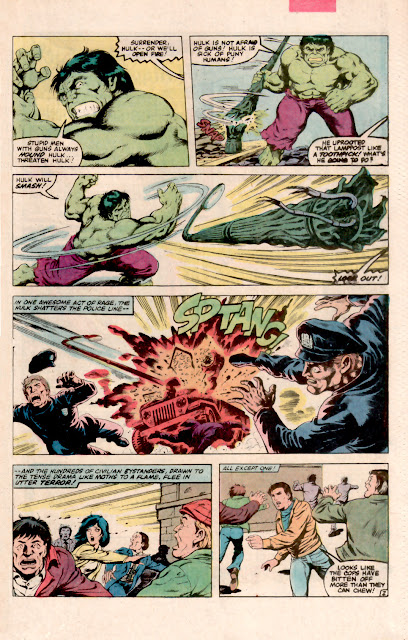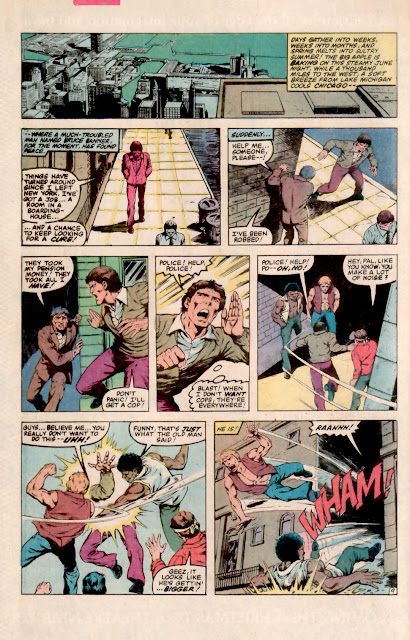Sunday, July 16, 2023
Double Zero
Wednesday, July 12, 2023
Obligation (Marvel Team-Up #126)
Sunday, July 09, 2023
First Double Trouble Play Test
I just completed my first play test of Double Trouble. There are some things that I really liked, and a few things that I felt needed to be improved. Overall the session was good and it seemed like everyone was having fun.
The Helped and Hindered mechanism and how it interacted with the Double Trouble Action roll seemed really confusing to my players. In an attempt to clarify things, I made a chart to show how different levels of the Helped or Hindered conditions would effect roll results.
This was the initial table:
Everyone said it made sense and we were good moving forward. And, we played. I ran a the pre-written adventure, Dragon Town.
It was my desire to run this adventure using my own home brew game system that prompted me to begin work on Double Trouble to start with.
I wanted to tie certain aspects of the system to OSR based parallels so that the adventure would be easy to run. - That worked.
I wanted to use Mike Pondsmith's brilliant RPG Dream Park as a template for character creation and development. - That worked. (I think that everyone really enjoyed the character creation process and options available.)
I wanted to retain the multiplied dice roll under system created for my own RPG Five By Five. - Uhm ... this was where I fear I may have some problems.
Referencing the table to figure out when rolls failed or succeeded seemed to really bog down the game play. Five By Five dice interpretation has always been quick and intuitive, but not here.
I like the added complexity of the Helped and Hindered conditions. They are the primary hooks on which all player powers are hung. When I mentioned changing them, my players revolted a little. But, I have no intention of getting rid of these. I just need to make them work a bit more smoothly.
To that end, I have decided to focus on "the exceptions." The irregular rolls that aren't compared to ability scores. That's the roll of a zero, and a roll of doubles. These special rolls are the exceptions. They are already special. I will make Helped and Hindered conditions effect only these rolls.
That should make interpreting rolls on the fly much easier, and I think is probably how I should have handled all of this to begin with.
Here's a new dice roll table:
Now, rolling over your trait is always a fail and rolling under your trait is always a success. Nothing else to check. The only time a roll needs to be verified is when you roll doubles or zero. The hope is that this will speed things up without causing the players to feel like they've lost some utility.
If this doesn't work, then I may scrap the Five By Five Mechanics completely for something else. Because the other elements of the game work and I like them.
Wednesday, July 05, 2023
Four More Anticipated Board Games 2023
Sagrada Artisans (2023)
This is a legacy campaign style game based on the dice game: Sagrada, a game that Julie and I really enjoy. In Sagrada players use transparent style colored dice in a variety of bright colors to lay out patterns. These then are meant to represent stained glass windows. Sagrada Artisans uses this theme and mechanic, but it's also a roll-and-write game. I think the idea of a legacy campaign style roll-and-write game is brilliant, and I don't think that Sagrada Artisans will be the last game of this type that we'll see.
Fit to Print (2023)
How about playing newspaper reporters collecting stories for the newspapers in 1950's America? Well, not really "America" because all the "people" in the game are represented by cute animals. Sound interesting to you? Then you might want to check out: Fit to Print. The newspaper theme really appeals to me and Julie. I am a little worried because the game has a "real time" element, but supposedly it is possible to play without it. So, we'll see.
Age of Comics: The Golden Years (2023)
From publishing newspapers in the 50's to publishing comic books in the 40's. Age of Comics really speaks to me. This might be a game created specifically with me in mind. I actually have a light little card game about collecting comic books that's surprisingly good. This is a chance to push that theme to the next level with involved worker placement mechanics and a pretty crunchy game that emulates the comic book publishing industry of the time.
Cosmoctopus (2023)
From a game made for me, to a game made for Julie. Julie's favorite Disney Princess in Ursula the Sea Witch. Is it just about the tentacles? Well, no ... but they sure don't hurt. In Cosmoctopus players collect card sets to gain the favor the the great cosmic space octopus: Cosmoctopus. This game has tentacles to spare. We just have to try it!
Sunday, July 02, 2023
Double Trouble: Fantasy Adventure (sample text #12)
Combat Scenes
Combats are a special kind of scene that engages the PCs' powers and involves lots of dice play. The GM always acts first, and players then take turns around the table.
Enemies
The term "enemy" refers to any NPC that wants to hurt a PC. Sometimes enemies can be reasoned with, but often the only option is to kill or be killed.
Initiative
On the GM's turn, they decide if monsters or PCs act first. This will be based on the circumstances in the scene, but it's usually monsters who start the fight.
Dodging Attacks
When a monster attacks, the PC takes damage unless they dodge. (Dodge in DT implies other defense actions like blocking.) PCs get 1 free dodge each turn.
Taking Damage
If their dodge fails, the PC takes the monster's attack damage. If their dodge is Trouble! the PC takes additional damage equal to the ST of Trouble! (See page 2.)
Counter Attacks
If dodge is Triumph! the PC gets an immediate free counter attack against their attacker, assuming that the attack is possible given the PC's current armament.
Attacks That Aren't Dodged
If a PC can't or doesn't want to take a dodge action to defend against an attack, they suffer the damage listed for the monster as if they had rolled a failure result.
Full Defense
When a player declares, "Full Defense," they give up their normal action on their turn. In exchange, the player gains unlimited free dodge actions for the turn.
Attack Skills
During a combat scene, a PC's most common action is to use their weapon to try to strike at and injure a monster. HTH, MWP and RWP are skills used for attack.
Rolling An Attack
PCs get one attack not including counter attack, dual wield and bonuses gained from powers. Rolling Success or Triumph! to attack triggers a Strength roll (see page 2.)
Rolling Damage
If your attack is a Success, roll a die and subtract that from your weapon's ST to see how much damage your weapon does. Minimum weapon damage is 1 (see page 2.)
Critical Damage
If your attack is a Triumph! roll a die and add that to your weapon's ST to see how much damage your weapon does. This is known as a critical hit! (See page 2.)
Trouble! on Attack Actions
If attack is Trouble! the monster makes an immediate counter attack against the PC that can't be dodged, assuming the attack is possible given the monster's armament.
Partial Success on Attack Actions
If attacking while Helped or Hindered, it's possible to roll a Partial Success. When resolving partial success for attack, Determine damage, but then cut the total in half.


















